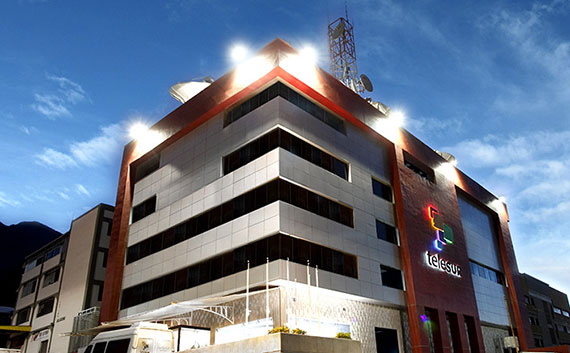This is neither a coincidence nor a surprise. For almost two decades they have been trying to silence Telesur, and from the moment we announced our intention to give the peoples of Latin America and the Caribbean their voice, to see us with our own eyes and not with those of the North, the United States and their imitators, the offensive against the Latin American-Caribbean channel began in our countries.
The sad thing is that the current Argentinean president believes that by imposing media censorship against Telesur in Argentina, he is silencing the voices of those who have been left voiceless by the established media; Indians, mulattos, and blacks, of peasants and workers, of students and artists.
The measure is essentially propagandistic: today, anyone in Argentina or anywhere in the world can access Telesur’s programming from a mobile phone.
The Argentinean government has decided to remove the signal of the Latin American and Caribbean news channel Telesur from the media network offered by Digital Terrestrial Television (TDA). The neoliberal government of Mauricio Macri had already denounced the agreement in the same context and with the same actions.
For President Javier Milei (or whoever gave him the order), Telesur is undoubtedly a danger because it reports what the established channels do not, and raises awareness among the broad sectors of the population it reaches with its content.
Censorship is a tool that the Mileinato does not only use internally since it has closed the Télam news agency and all its correspondents. It has also emptied the content of public television and the Encuentro channel, attacking any critical opinion and demonizing it through its spokesman or the networks.
Perhaps the order came from the “sympathetic” head of the US Southern Command, General Laura Richardson, or CIA Director William Burns on his recent “inspection” visits to Argentina. Since 2005, the United States has been trying to put an end to Telesur and those who promote it. And Milei, not wanting to have uncomfortable witnesses to his misgovernment, has carried out his attack on freedom of expression and the right of Argentines to be informed in a pluralistic way.
They smile in Washington.
In February 2006, Telesur was criticized by the United States for having signed agreements to exchange audiovisual content with the Arabic news channel Al-Jazeera. US Congressman Connie Mack IV said that “this new alliance has the effect of creating a global television network for terrorists and other enemies of freedom”. As director general of Telesur, I replied that the channel “firmly believes in democracy, freedom of expression and pluralism: the values that are indispensable in any democracy”.
The measure taken by Milei undoubtedly represents a serious attack on the right to information, limiting access to dissident voices, restricting the plurality of information, undermining the possibility of forming informed opinions and actively participating in public debate. This is what it is all about murdering the truth, imposing a single truth that allows and applauds genocides and the exploitation of peoples, making realities invisible, feeding hatred and wars, and opposing any attempt at integration and cooperation between our peoples.
In this way, it is possible to show that we are all white (and maybe even blonde with pale blue eyes), to silence the Latin American diversity, politics, and opinions that exist in the continent, to try to prevent the rescue and recovery of our memory, to know where we come from, because people who do not know where they come from are unlikely to know where they are going, and so it is easier to manipulate them.
The first slogan Telesur had was “Our North is the South”, a phrase by Joaquín Torres García, a Uruguayan Catalan, and after that the first idea was that we are all Telesur, in other words, Telesur was not a genius who explained to the Indians what it was all about. It is a cultural problem, a problem of cultural colonization. We are colonized and some governments still believe in this external format.
It is not enough to “denounce” the action of the Argentinean government, yes, but to make use of memory. Many of those who are now tearing their hair out, even from progressive governments, did little in Argentina to strengthen Telesur: from high officials who recommended more information from Paris, London, and New York because “nobody cares what happens to the little black people”, to those who assumed that it was a springboard to finance their projects.
The problem is that we talk a lot about liberation, we put up posters, we shout liberation, and what we have to liberate are the 2,200 cubic centimeters we have in our heads, we have to reformat the hard drive, we have to rethink everything and see how we can make what we call the democratization of communication a reality, to give a voice and an image to all those who have never had a voice or an image, who have been made invisible, hidden, ignored, and who continue to be made invisible, hidden and ignored: that is what it is all about.
In addition to Argentina’s action against Telesur, we can add the European Union’s closure of Russia Today, the United States’ closure of Press TV, which is trying to take over China’s TikTok, and Israel’s closure of Al Jazeera. All in the name of freedom of expression and democracy.






